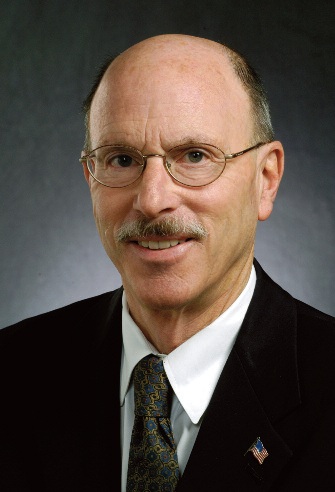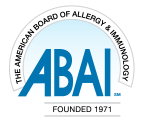President's Message: Stephen I. Wasserman, MD
Responding to Diplomate Concerns to Enact Positive Program Updates
by Stephen I. Wasserman, MD

Our Directors met in late April and there are a number of decisions they made that should impact you in a very positive way. As you might expect much of the meeting, held at the Westin O’Hare Hotel in Rosemont, IL, was focused on opportunities to improve Maintenance of Certification (MOC). As you know due to favorable market conditions we have been able to diminish the cost of our secure examinations by $200, and to now provide our peer/patient assessment tool and our Patient Safety modules free of charge. We are continuing to try to diminish the hassle factor for you as well and have simplified our processes for diplomate reporting of licensure status and CME accumulation. Beginning this summer diplomates will be able to report licensure status by attestation only and a hard copy of one’s license will be required only at the time of registration for the examination. In addition we will now permit 25 hours of CME in Allergy/Immunology annually to be claimed by attestation as well. ABAI will continue to electronically receive CME credits from the American Academy of Allergy Asthma & Immunology (AAAAI), American College of Allergy, Asthma & Immunology (ACAAI), Clinical Immunology Society (CIS) and Georgia Regents University. ABAI is happy to continue to receive any CME credits electronically but will not require any copies to be sent to the office. We continue to encourage CME that meets goals identified by assessment of knowledge or performance gaps, so called self-assessment CME, but this is not required. To assure compliance with these attestation processes, a small percentage of diplomates will be audited and requested to provide proof of CME in the old-fashioned way. The Board hopes these modifications will diminish time and paperwork demands on our busy diplomates.
Perhaps of more interest are the efforts that the ABAI Directors have made in examining our processes for the secure examination (Part III of MOC) and for Practice Assessment/Quality Improvement (Part IV of MOC). With regard to the latter we are working closely with AAAAI as they roll out their Quality Clinical Performance Reporting registry and plan to make participation in this registry, (which complies with CMS requirements for value-based payment), fulfill Part IV requirements as well—thus providing a two-fer
and diminishing redundancy in meeting MOC. The ABMS has begun working on task forces to examine the unique needs of military physicians, academic physicians especially those engaged in research, and physician executives. ABAI is active in these efforts with Dr. Gurjit K. Hershey serving on the academic physicians working group, and Dr. Wasserman serving on the physician executives group. In addition, ABAI has convened its own task force to make recommendations as to how to enable our academic physician scientists to meet Part IV requirements in a way that reflects their professional responsibilities.
With regard to the secure examination ABAI has begun to think hard as to how to respond to diplomate concerns that it no longer reflects practice realities and that the current system of administration in test centers can prove inconvenient and demeaning. The Directors have decided to explore a number of opportunities. First, we have reached out to the American Board of Dermatology (ABD) which piloted a test of their examination at home or in the diplomate’s office for a small cohort of their candidates to learn more about this process. This test required the capability to perform proctoring via the computer to assure the test taker’s identity was authenticated and that the integrity of the examination was not compromised. The acceptance of this process by test takers and the ABD was extremely high and almost all who tried it would do it again. ABAI will begin discussions as to how to provide our examination in a similar way. Second, we have also begun to discuss the possibility of developing a modular examination with a core of Allergy and Immunology questions for all examinees, and a second module that could be selected from a menu of options that would hopefully more closely reflect the practice scope of individual diplomates. Such options could include more advanced and focused questions in adult allergy, pediatric allergy, airway disorders (i.e., asthma, sinusitis, rhinitis), cutaneous allergy (i.e., urticarial/angioedema, atopic and contact reactions including ocular allergy) and immunodeficiency disorders and perhaps other areas as well. The ABAI plans to reach out to our diplomates to help us identify appropriate modules that seem most appropriate to you. This might prove expensive and obviously cost will guide our enthusiasm for this approach. Third, we have begun collaborations with the American Board of Dermatology, the American Board of Radiology, the American Board of Pathology and the pulmonary subspecialty committee of the American Board of Internal Medicine to obtain images that will permit highly pertinent clinical scenarios to dominate our examination questions. We sincerely anticipate that with the added dimension of high quality images our examination can more fully reflect the clinical reality of practice. Finally we have also begun to think hard about permitting use of reference materials during the examination – i.e., moving to an open-book exam. This requires an ability to identify appropriate materials and to make sure they are available to all exam takers. This is both a logistical and financial hurdle, but we have heard you and truly want to make sure this examination more closely resembles current practice realities. Toward this end we are monitoring similar efforts by other boards and examination entities to identify barriers and opportunities. This again may prove costly and its implementation requires us to examine changes in examination performance, and cost of developing and obtaining appropriate materials prior to implementation. But stay tuned, this will be an area of activity by the board.
Most importantly the ABAI Directors, Staff and I welcome your comments and suggestions on any of these topics. Your candid feedback has driven many improvements, and will do so going forward.
Please share your thoughts with me on this topic at abai@abai.org or swasserman@ucsd.edu.
